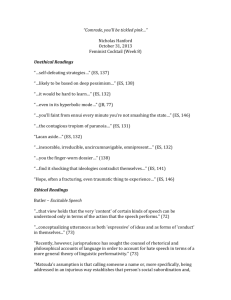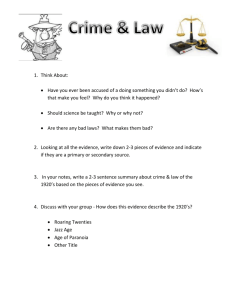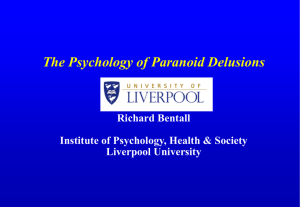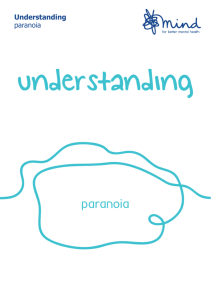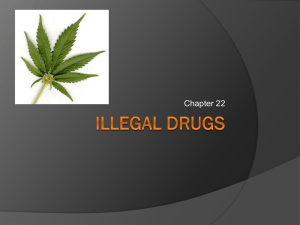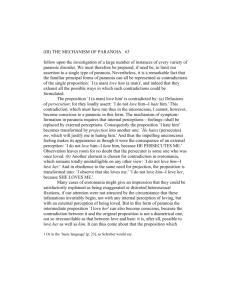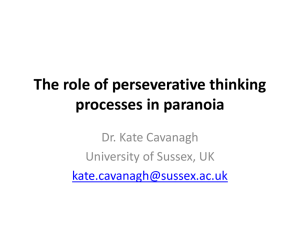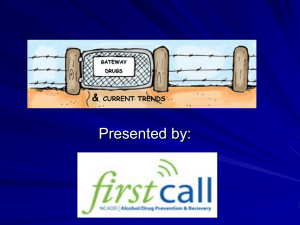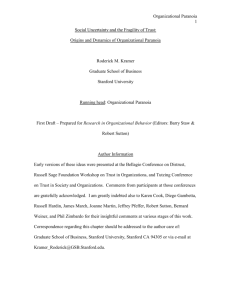paranoia – Wissam Timani
advertisement
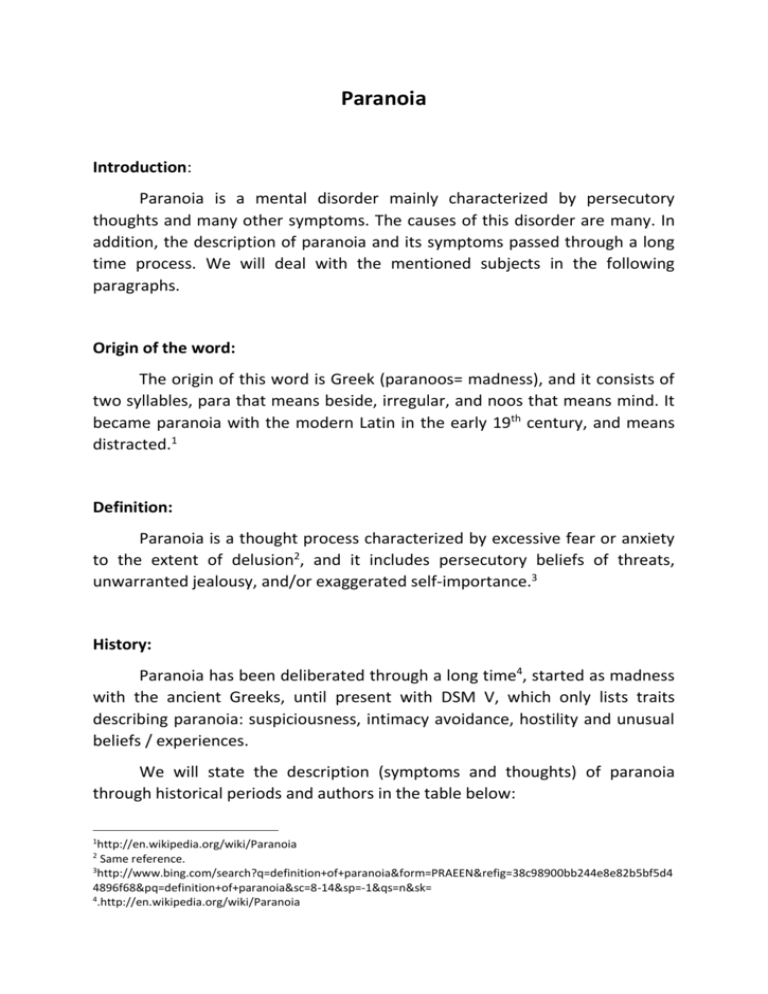
Paranoia Introduction: Paranoia is a mental disorder mainly characterized by persecutory thoughts and many other symptoms. The causes of this disorder are many. In addition, the description of paranoia and its symptoms passed through a long time process. We will deal with the mentioned subjects in the following paragraphs. Origin of the word: The origin of this word is Greek (paranoos= madness), and it consists of two syllables, para that means beside, irregular, and noos that means mind. It became paranoia with the modern Latin in the early 19th century, and means distracted.1 Definition: Paranoia is a thought process characterized by excessive fear or anxiety to the extent of delusion2, and it includes persecutory beliefs of threats, unwarranted jealousy, and/or exaggerated self-importance.3 History: Paranoia has been deliberated through a long time4, started as madness with the ancient Greeks, until present with DSM V, which only lists traits describing paranoia: suspiciousness, intimacy avoidance, hostility and unusual beliefs / experiences. We will state the description (symptoms and thoughts) of paranoia through historical periods and authors in the table below: 1 http://en.wikipedia.org/wiki/Paranoia Same reference. 3 http://www.bing.com/search?q=definition+of+paranoia&form=PRAEEN&refig=38c98900bb244e8e82b5bf5d4 4896f68&pq=definition+of+paranoia&sc=8-14&sp=-1&qs=n&sk= 4 .http://en.wikipedia.org/wiki/Paranoia 2 Period/ Author DSM III/Magnan Kraepelin 1905 Kraepelin 1921 Blueler Kretschmer Jaspers Schnider 1950 Symptoms Thoughts Fragile personality, hypochondria, undue sensitivity, suspiciousness. Pseudo-querulous personality, vain, selfabsorbed, obstinate.Litigious, distrustful. Idiosyncratic and referential thinking. Grandiosity. Contradiction between feeling shy and the attitude of entitlement. Overcompensation. Feelings of persecution. Their failure is due to machination. Feeling of inadequacy. Inner humiliation, selfdeprecation. Vulnerable. Two types: 1) combative, actively quarrelsome, eccentric, 2) passive and secretive. Leonhard and Overvaluing their abilities. Shepherd, Sixties Polatin 1975 Rigid, watchful, selfish, emotionally undemonstrative. Explode if confronted with different opinion. Millon, Vigilance, abrasive irritability Eighties and counterattack. Social isolation, hostile distancing of oneself from others. DSM IV Unforgiving of insults, perceives attacks and reacts angrily, suspicious. Feeling subjected to hostility and oppression. Failure due to ill will of others. Inwardly hypersensitive. Thoughts of mistrust. Denial of personal insecurities. Thoughts of being deceived, doubts about loyalty, reads hidden thoughts of others. Causes of Paranoia: Causes of paranoia are classified into two main categories: Physical / Mental causes: Chemical changes in the brain and physical causes of paranoia are not fully understood, but symptoms of paranoia occurs in many mental disorders,certain physical (neurological) diseases and as a side effect of the use of certain drugs and chemicals. Individuals suffering fromphysical / neurological diseases such as strokes, brain injuries, various types of dementia (including Alzheimer disease), Huntington andParkinson’sdiseases, and multiple sclerosis, manifest paranoia as a symptom of the mentioned diseases5. The common factor among these diseases is the damage of some brain cells. Some medications and drugs can also cause paranoia,depending on the dosage and time course. The table below shows some of these drugs and their side effects: Drug name Corticosteroids H-2 blockers Amantadine Amphetamines Anti-HIV medications Cocaine and other addictive drugs 5 Reason Decrease central nervous system serotonin levels.6 Affect histamine and interfere with the absorption of vitamin B-12. Both are important to the brain function.7 Works on dopaminergic and adrenergic activities.8 Increase the hormones’ amount, which causes the symptoms when they reach the brain.9 Create a high level of Efavirenz, which belongsto a class of drugs known as non-nucleoside reverse transcriptase inhibitors (NNRTIs).10 Cause high blood pressure that may lead to strokes, seizures, brain cells and blood vessels damage.11 http://en.wikipedia.org/wiki/Paranoia http://www.drrichardhall.com/steroid.htm 7 http://www.webmd.com/alzheimers/news/20070803/acid-blockers-linked-to-mental-decline?page=2 8 http://en.wikipedia.org/wiki/Amantadine 9 http://amphetamines.com/effects/psychological-effects-of-amphetamines/ 10 http://www.aidsmap.com/HIV-treatment-side-effects-and-mental-health/page/1439569/ 11 http://www.drugfreeworld.org/drugfacts/cocaine/effects-of-cocaine.html 6 The common factor among the affected hormones is their role as neurotransmitters, which help neurons in the brain to perform the synapse. A synapse is the transition of electric signals from one neuron to another.Paranoia could happen due to ill synapse. Paranoia in psychoanalytical approach: Paranoia is related to the anal stage in the early childhood period (Bergeret)12, and it consists of the trio of homosexuality, fixation, and projection. Castration complex, attachment to the mother, narcissism, and fear of castration, are the factors of homosexuality, adding to them the premature fixation of the libido. In early childhood, jealousy arises against rivals (older brothers or sisters); these feelings are aggressive and may contain death wishes. Thus, they are repressed (due to training) and transformed so that the rivals of the earlier period become the first homosexual love objects. (Freud)13 The fusion relationship with the mother leads the child to identify himself with her, and to search for love objects where he can rediscover himself. Due to this attachment and fixation on the mother (his first love object), it becomes hard to pass on to another woman.In addition to this, a high value is set on his male organ accompanied by the fear of losing it in the love object of the other sex. This happens when the child discovers that a woman does not have a penis.Thus, paranoia is a defense against homosexuality. On the other hand, the father turns into the persecutor, due to the primal scene; he took the mother, humiliated the child, and was unfaithful. The father is denied as the law imposer and security provider, and this is related first, to the fusion relationship between the child and his mother, who did not let the child see or determine the father as another (law imposer). That happens during the mirror stage (LACAN)14. The father, in such situations, could be of no mentioned importance (not strong enough to impose the law). 12 http://www.ovni.ch/~farfadet/bergeret,html Freud, Sigmund. Certain neurotic mechanism in jealousy, paranoia and homosexuality. International journal of psychoanalysis. 14 Mills, Jon. Lacan on Paranoiac knowledge. 13 Delusional jealousy in paranoiacs, originates from the repressed impulses towards unfaithfulness of the object(Freud), which is of the same sex of the subject, so that it contains an acidulated homosexuality. The feelings of unfaithfulness are projected on the love object (partner). In this case, the reality is denied, the imaginary is delusional, and the symbolic is illogical. The desire of not to know becomes the master of the situation. (LACAN) Based of the early childhood experience, a paranoid individual uses cleavage, splitting, denial of reality, projective identification and projection as defense mechanisms. He has an unintegrated ego, a fragmented self-image, as well as a lost identity and object. (Melanie Klein)15 Treatment: The efficiency of paranoia treatment depends on the cause and if it is determined accurately. As we mentioned above, paranoia can occur due to several diseases and drugs. In these two cases, the symptoms of paranoia may vanish or decrease when the disease is treated in the first case, and if the medication that causes the symptoms is stopped or is taken in corrected dosage… Paranoia as a mental disease should be treated under the care of psychiatric physician with typical antipsychotic medications such as Chlorpromazine or Haloperidol, or with atypical antipsychotic medications such as Clozapine, Olanzapine, or Risperdone.16 Some paranoid individuals can improve with the help of support groups, especially when family members and friends of the patient attend such groups and learn how to deal with the concerned individual. Gestalt school recommends support groups. In psychoanalytic approach, paranoid patients do not seek help due to suspicious attitude, so they do not coordinate with the psychotherapist. Those individuals do not admit their illness, and they fail to reach transference with the therapist. (Freud)17 15 http://www.melanie-klein-trust.org.uk/paranoid-schizoid-position http://en.wikipedia.org/wiki/Paranoia 16 17 A. Fried, Joseph Agassi, Paranoia: A study in Diagnosis. https://books.google.com.lb/books?id=N_nOBgAAQBAJ&pg=PT138&lpg=PT138&dq=of+Sydenham%27s,+and+in+the +following+way.+Jackson%27s+principles+claim+that+the&source=bl&ots=K4KQZxEkd8&sig=Md6Kax0hveNhdJl6CK Contagious Paranoia: We can apply the definition of paranoia to large groups of people, who are characterized with fearfulness, hypersensitivity, suspiciousness, hostility and other paranoid properties. It is contagious and untreatable. Paul Balles gives examples of national paranoia18, the Cold War between the US and Russia, and the security measures in the USA after 9/11… QJkO4sHEg&hl=en&sa=X&ei=K1_zVJTFB873ao_WgLAO&ved=0CBwQ6AEwAA#v=onepage&q=of%20Sydenham's% 2C%20and%20in%20the%20following%20way.%20Jackson's%20principles%20claim%20that%20the&f=false 18 Balles, Paul. Contagious Paranoia, http://www.veteranstoday.com/2012/09/09/contagious-paranoia/
